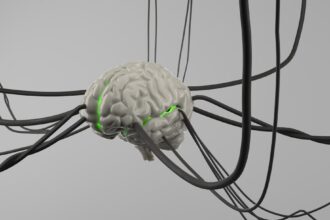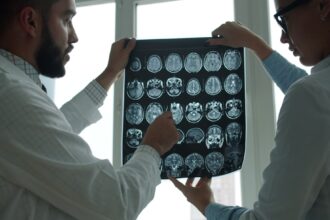Depersonalization and derealization disorder is a complex mental health condition that can leave you feeling detached from your own thoughts, feelings, and sense of self. When experiencing depersonalization, you might feel as though you are an outside observer of your own life, as if you are watching yourself from a distance. This sensation can be disorienting and unsettling, often leading to confusion about your identity and reality.
On the other hand, derealization involves a sense of detachment from your surroundings, making the world around you feel unreal or distorted.
This disorder is not merely a fleeting feeling; it can persist for extended periods, significantly impacting your daily functioning.
While many people may experience brief episodes of depersonalization or derealization during times of stress or trauma, those with the disorder experience these sensations more frequently and intensely. The condition can be triggered by various factors, including extreme stress, trauma, or even substance use. Understanding this disorder is crucial for recognizing its effects on your life and seeking appropriate help.
Key Takeaways
- Depersonalization and Derealization Disorder is a mental health condition characterized by feeling detached from oneself and the surrounding environment.
- Signs and symptoms of the disorder include feeling like an outside observer of one’s thoughts and actions, experiencing a sense of unreality, and feeling emotionally numb.
- The causes of Depersonalization and Derealization Disorder are not fully understood, but it is believed to be related to trauma, stress, and certain personality traits.
- Diagnosis of the disorder involves a thorough evaluation of symptoms, medical history, and ruling out other potential causes through physical and psychological assessments.
- Treatment options for Depersonalization and Derealization Disorder may include therapy, medication, and self-help strategies to manage symptoms and improve quality of life.
Signs and Symptoms of Depersonalization and Derealization Disorder
The signs and symptoms of depersonalization and derealization disorder can vary widely from person to person. You may find yourself frequently questioning your own reality, feeling as though you are living in a dream or that your thoughts and actions are not your own. This can lead to a profound sense of confusion and anxiety, as you struggle to reconcile your experiences with the world around you.
You might also experience emotional numbness, where feelings of joy, sadness, or anger seem muted or absent altogether. In addition to these emotional symptoms, physical sensations may accompany depersonalization and derealization. You might notice changes in your perception of time, feeling as though time is moving too quickly or too slowly.
Some individuals report a sense of heaviness in their limbs or a feeling of being disconnected from their body. These symptoms can be distressing and may lead to avoidance behaviors, where you withdraw from social situations or activities that exacerbate your feelings of unreality.
Causes of Depersonalization and Derealization Disorder

The exact causes of depersonalization and derealization disorder remain unclear, but several factors may contribute to its development. One significant factor is trauma; experiences such as abuse, accidents, or the loss of a loved one can trigger episodes of depersonalization and derealization. Your mind may use these dissociative mechanisms as a coping strategy to protect you from overwhelming emotions associated with these traumatic events.
In this way, the disorder can serve as a defense mechanism against psychological pain. Additionally, high levels of stress and anxiety can play a role in the onset of this disorder. If you are constantly under pressure—whether from work, relationships, or other life circumstances—you may find yourself more susceptible to feelings of detachment.
Substance use is another potential contributor; certain drugs can induce dissociative symptoms that may persist even after the substance has worn off. Understanding these potential causes can help you identify triggers in your own life and seek appropriate interventions.
Diagnosis of Depersonalization and Derealization Disorder
| Diagnosis of Depersonalization and Derealization Disorder | |
|---|---|
| Prevalence | 1-2% of the population |
| Age of Onset | Usually in adolescence or early adulthood |
| Duration | Episodes can last for hours, days, months, or even years |
| Symptoms | Feelings of detachment from oneself or the environment, altered perception of reality, emotional numbness |
| Diagnostic Criteria | Presence of persistent or recurrent episodes of depersonalization, derealization, or both |
| Treatment | Therapy (e.g., cognitive-behavioral therapy), medication (e.g., antidepressants) |
Diagnosing depersonalization and derealization disorder typically involves a comprehensive evaluation by a mental health professional. During this process, you will likely discuss your symptoms in detail, including their frequency, duration, and impact on your daily life. The clinician may also inquire about any past trauma or stressors that could be contributing to your experiences.
It’s essential to be open and honest during this assessment to ensure an accurate diagnosis. To meet the criteria for depersonalization and derealization disorder, your symptoms must cause significant distress or impairment in social, occupational, or other important areas of functioning. The clinician will also rule out other mental health conditions that may present similar symptoms, such as anxiety disorders or post-traumatic stress disorder (PTSD).
A thorough understanding of your history and current experiences will help the clinician determine the most appropriate diagnosis and treatment plan.
Treatment Options for Depersonalization and Derealization Disorder
Treatment for depersonalization and derealization disorder often involves a combination of psychotherapy and medication. Cognitive-behavioral therapy (CBT) is one effective approach that helps you identify negative thought patterns and develop healthier coping strategies. Through CBT, you can learn to challenge distorted perceptions of reality and gradually re-engage with your emotions and surroundings.
Antidepressants or anti-anxiety medications can provide relief from these co-occurring symptoms, allowing you to focus on addressing the underlying issues related to depersonalization and derealization. It’s important to work closely with your healthcare provider to determine the best treatment plan tailored to your specific needs.
Coping Strategies for Depersonalization and Derealization Disorder

In addition to professional treatment, there are several coping strategies you can employ to manage symptoms of depersonalization and derealization disorder in your daily life. Mindfulness practices can be particularly beneficial; engaging in mindfulness meditation or grounding exercises can help anchor you in the present moment. By focusing on your breath or the sensations in your body, you can create a sense of connection to reality that may alleviate feelings of detachment.
Another effective strategy is maintaining a routine that includes regular physical activity, healthy eating, and sufficient sleep. These lifestyle factors play a crucial role in overall mental health and can help reduce anxiety levels that may trigger episodes of depersonalization or derealization. Additionally, journaling about your experiences can provide an outlet for processing emotions and tracking patterns in your symptoms over time.
Impact on Daily Life and Relationships
The impact of depersonalization and derealization disorder on daily life can be profound. You may find it challenging to engage fully in activities that once brought you joy or fulfillment due to feelings of detachment. This disconnection can lead to difficulties in maintaining relationships with friends, family, or colleagues, as they may not understand what you are experiencing.
You might feel isolated or misunderstood, which can exacerbate feelings of loneliness. Moreover, the disorder can affect your ability to perform at work or school. Concentration difficulties may arise as you struggle to focus on tasks when grappling with feelings of unreality.
This can lead to decreased productivity and increased stress levels, creating a cycle that further perpetuates your symptoms. Recognizing these impacts is essential for seeking support from loved ones and professionals who can help you navigate these challenges.
Co-occurring Disorders and Depersonalization and Derealization Disorder
Depersonalization and derealization disorder often co-occur with other mental health conditions, complicating diagnosis and treatment. Anxiety disorders are particularly common among individuals with this disorder; the constant state of worry can trigger episodes of detachment as a coping mechanism. Similarly, depression frequently accompanies depersonalization and derealization disorder, leading to feelings of hopelessness that can further exacerbate symptoms.
Substance use disorders may also be present in individuals experiencing depersonalization and derealization symptoms. Some people may turn to drugs or alcohol as a way to escape their feelings of unreality, which can create additional challenges in recovery. It’s crucial to address these co-occurring disorders holistically during treatment to ensure comprehensive care that targets all aspects of your mental health.
Understanding the Difference Between Depersonalization and Derealization
While depersonalization and derealization are often discussed together due to their similarities, it’s essential to understand the distinctions between the two experiences. Depersonalization primarily involves a disconnection from oneself; you may feel as though you are observing your thoughts or actions from outside your body. This sensation can lead to confusion about your identity and emotional state.
In contrast, derealization pertains to a disconnection from the external world; you might perceive your surroundings as distorted or unreal. This experience can create a sense of alienation from people or places that once felt familiar. Recognizing these differences can help you articulate your experiences more clearly when seeking support or treatment.
Research and Future Directions for Depersonalization and Derealization Disorder
Research into depersonalization and derealization disorder is ongoing, with scientists striving to better understand its underlying mechanisms and effective treatment options. Recent studies have explored the neurobiological aspects of the disorder, examining how brain function may contribute to dissociative experiences. This research aims to identify potential biomarkers that could aid in diagnosis and treatment planning.
Future directions in research may also focus on developing targeted therapies that address the unique needs of individuals with this disorder. As awareness grows within the mental health community, there is hope for more comprehensive treatment approaches that integrate both psychological and physiological perspectives on depersonalization and derealization.
Support and Resources for Individuals with Depersonalization and Derealization Disorder
Finding support is crucial for navigating the challenges associated with depersonalization and derealization disorder. Numerous resources are available for individuals seeking help; mental health professionals specializing in dissociative disorders can provide valuable guidance tailored to your specific needs. Support groups—both online and in-person—can offer a sense of community where you can share experiences with others who understand what you’re going through.
Additionally, educational resources such as books, articles, and websites dedicated to mental health can provide further insight into managing symptoms effectively. Engaging with these resources empowers you to take an active role in your recovery journey while fostering connections with others who share similar experiences. Remember that seeking help is a sign of strength; you don’t have to navigate this journey alone.
Depersonalization and derealization disorder is a complex mental health condition characterized by persistent feelings of detachment from one’s body or surroundings, often described as feeling like an outside observer of oneself or the world. For those seeking to understand this disorder more deeply, an insightful article can be found on Unplugged Psych. This article delves into the symptoms, causes, and potential treatments for depersonalization and derealization disorder, providing valuable information for both sufferers and those supporting them. To read more about this topic, visit the article on Unplugged Psych.
LEARN MORE About Unmasking the Mysteries Behind Depersonalization and Derealization
FAQs
What is depersonalization and derealization disorder?
Depersonalization and derealization disorder is a mental health condition characterized by feeling detached from oneself (depersonalization) and feeling detached from the world or surroundings (derealization). It can be a distressing and disruptive experience for those who suffer from it.
What are the symptoms of depersonalization and derealization disorder?
Symptoms of depersonalization and derealization disorder may include feeling like an outside observer of one’s thoughts, feelings, and body, feeling like the world is unreal or distorted, and feeling emotionally numb or disconnected from one’s surroundings.
What causes depersonalization and derealization disorder?
The exact cause of depersonalization and derealization disorder is not fully understood, but it is believed to be related to a combination of biological, psychological, and environmental factors. Trauma, stress, anxiety, and substance abuse are commonly associated with the development of this disorder.
How is depersonalization and derealization disorder diagnosed?
Depersonalization and derealization disorder is diagnosed based on a thorough assessment of the individual’s symptoms, medical history, and any potential underlying mental health conditions. A mental health professional, such as a psychiatrist or psychologist, can make a diagnosis and develop a treatment plan.
What are the treatment options for depersonalization and derealization disorder?
Treatment for depersonalization and derealization disorder may include psychotherapy, medication, and stress-reduction techniques. Cognitive-behavioral therapy (CBT) and mindfulness-based approaches have shown to be effective in helping individuals manage their symptoms and improve their quality of life.
Can depersonalization and derealization disorder be cured?
There is no specific cure for depersonalization and derealization disorder, but with appropriate treatment and support, many individuals are able to manage their symptoms and lead fulfilling lives. It is important for individuals to seek professional help and develop coping strategies to address their symptoms.




